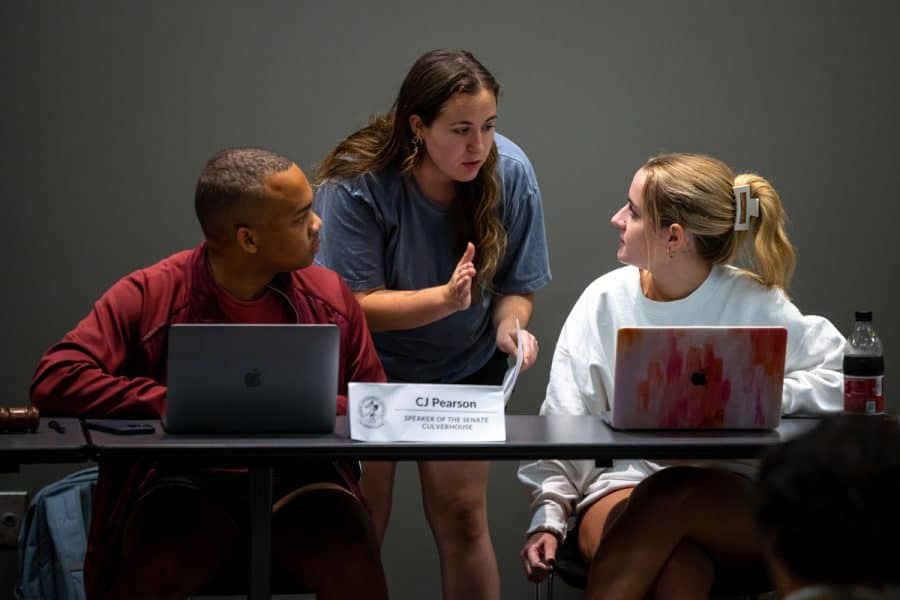Understanding SGA
May 29, 2023
Founded in 1914, the Student Government Association exists to advocate for students and represent students in University decisions.
The SGA follows a code of conduct and constitution and is split up into three branches: the Senate, Executive Council and Student Judiciary.
Judicial Board
The Judicial Board exercises the SGA’s judicial powers and is led by a chief justice.
Abby Morthland, a junior majoring in Spanish and philosophy with a minor in the Randall Research Scholars Program, will be serving as chief justice for the coming school year.
“SGA is charged with bettering campus life; we are entrusted by the campus body to listen and strive honestly as their representation,” Morthland said. “This means that we can and should work to give each campus member a safe and enjoyable experience, which is the goal of the University, as a whole.”
According to the SGA Constitution, the Judicial Board oversees decisions ranging from parking regulations to impeachments.
In relation to the rest of the Judicial Board, Morthland will be responsible for hearing cases of misconduct, parking violation appeals, Tide Loyalty Point appeals, elections appeal, Constitutional appeals in addition to ensuring case hearings run smoothly.
The Judicial Board consists of one justice for every 1,200 enrolled students with a minimum of 15 justices and up to one clerk for 6,000 enrolled students. The number of the present number of associate justices and clerks will be decided by the Office of Student Conduct prior to the opening of the selections processes.
“Our Clerks and Justices work incredibly hard to walk students through our processes- they make my job easy on that front- and many of my out-of-office responsibilities then lie with handling special (election or Constitutional) appeals,” Morthland said.
In relation to the rest of student government and the administration, Morthland works on increasing collaboration within the branches of student government in addition to serving as a liaison between advisers.
“To the student government, I work with our executive members to ensure cohesion and collaboration amongst branches. SGA-wide initiatives and programming are a great opportunity for teamwork,” Morthland said. “And to the University administration, I serve as a liaison between our advisers, most specifically helping the Office of Student Conduct in the planning and administration of their conduct processing.”
Morthland plans on improving the lives of UA students through exercising empathy.
“The Judicial Branch is that through which most of the student body experiences the SGA. In this way, I will work to create a warm, compassionate experience for the students we hear. There is an existing understanding that we meet students on some of their worst days, and I plan to continue this encouragement of empathetic and gentle processing,” Morthland said. “One of my favorite aspects of Judicial Board has been the extent to which our members embody these qualities in meeting with students, and I have incredible admiration for that.”
Morthland emphasized her and her colleagues’ commitment to fairness.
“I can only dedicate the same time and due diligence as set by example of my predecessor, Caleb Thome, and trust that through this commitment to fair and just trial, any such misconceptions are naturally resolved. In our training and our practice, we hold ourselves to the expectation that all students coming through our Office are respected, heard, and fairly adjudicated,” Morthland said.
Executive branch
The executive branch is composed of the president; executive vice president; executive secretary; vice president for academic affairs; vice president for external affairs; vice president for student affairs; vice president for diversity, equity and inclusion; and vice president for financial affairs, according to the SGA Constitution.
Collier Dobbs is a junior studying economics and finance and will serve as the SGA’s president for the upcoming term.
“I think the role of SGA is to provide students with the resources they need to be at the same time be able to speak on their behalf to administration and really just be able to represent everyone their actions, programs and initiatives,” Dobbs said.
The responsibilities of the SGA president include leading the Executive Council and the SGA in completing objectives of the constitution, notifying the Senate of vacancies in the Executive Council or the Executive Cabinet, calling special sessions, reappointing officials of the executive branch, delivering the “State of the School Address” each semester, forming new committees, serving as a member of all executive committees, and the ability to exercise a limited veto power.
The president leads the executive branch and presides over the Executive Council.
It enforces the constitution and legislation, nominates replacements for vacancies, and delegates duties to the vice president as necessary.
Under the president, there is an Executive Cabinet of vice presidents with their own cabinets. These include vice presidents for financial affairs; academic affairs; diversity, equity and inclusion; and student affairs, and an executive secretary. The remaining positions include chief administrative officer, chief adviser, director of programming and advancement, director of engagement, director of environmental affairs, director of communications, director of IT and webmaster, director of strategic initiatives, press secretary, chief justice, speaker of the Senate, and deputy chief of staff.
As SGA president, Dobbs plans on increasing visibility and funds for needs-based scholarships the student government offers. One scholarship that Dobbs wants to bring to attention is the SGA needs-based scholarship. The scholarship will help cover non-academic expenses such as rent, car payments and etc.
“Last year alone, we have raised almost $11,000 for these scholarships through initiatives like Battle of the Bands, generally Taste Tuscaloosa, which is the percentage night for businesses around Tuscaloosa,” Dobbs said. “I’m really looking forward to getting the applicant numbers up this year and expanding the amount of money in that scholarship. I want everyone to know that’s a thing and I encourage them all to apply for it.”
Additionally, Dobbs is planning on increasing transparency and communication between the SGA and the rest of campus.
“I’m bringing back a couple programs this year that we’ve done in the past and one of them is club chats,” Dobbs said. “We’re going to be hosting Curriculum Chats to be more proactive.”
Malea Benjamin, an honors communication studies and political science pre-law student in her junior year at the University, will serve as the director of engagement for the 2023-2024 term.
“The slogan for the SGA is ‘students serving students.’ I really think that we truly embody that. The role of SGA is to provide resources for students and serve as an advocate for students,” Benjamin said.
As director of engagement, Benjamin will be responsible for running programs to increase engagement with students, such as revamping the SGA committees for clubs on campus.
Benjamin works at the Intercultural Diversity Center, and desires to use her knowledge to have a more culturally diverse engagement with SGA. Benjamin envisions increased collaboration with multicultural groups on campus to get them involved in student government.
“The reason that was a focus of mine is because my high school refused to celebrate Black History Month, so that is something that I wanted to implement within my college years,” Benjamin said. “I want to use my knowledge to get a bunch of diverse and talented students engaged with SGA in the Intercultural Diversity Center through collaborations with different multicultural groups on campus to get them involved with SGA as well as incorporated with the DEI committee.”
Applications for SGA committees are rolling and are open to all students wanting to get involved with student government.
“It’s always whoever wants to get involved,” Dobbs said. “Everyone who wants to come hang out with us and make a change. It’s a great way to get involved really, truly.”
In addition to running the committees, Benjamin will be engaging with the incoming freshman through informational events during Weeks of Welcome. She also plans to increase awareness of the First Year Council, an organization that designates students to represent the freshman class and gives them opportunities to gain experience in the legislative branch of student government.
Additionally, Benjamin hopes to be a part of increasing student knowledge on the SGA’s Lobby Board.
The Lobby Board is composed of students that advocate for students and increase awareness of various political causes such as voter education and advocacy for education within state and federal programs.
Before Benjamin was elected as director of engagement, she served as head of the Diversity, Equity, and Inclusion Committee. In this position, Benjamin was able to rejuvenate the SGA’s participation in Black History Month and looks forward to increasing representation of different cultural groups within student government.
Senate
The Senate is made up of 50 student members, with at least two seats for each of the University’s colleges.
The Senate holds special sessions when the SGA president deems necessary or when two-thirds of the Senate votes to hold one. These sessions range from electronic voting bills to resolutions that encourage the University to increase student wages.
“I think a very good example of legislation translating into action was President Collier Dobbs passed some legislation during his term as one of the vice presidents, along with the speaker of the Senate, that encouraged the University to provide menstrual products in the bathrooms,” Benjamin said.
Another example is the renaming of the education building to Autherine Lucy Hall to commemorate her impact on history as the first African American student at The University of Alabama. Benjamin said the SGA did not have the power to rename the hall in her honor, but it successfully advocated for the change.
Morthland said she joined the SGA because of her eagerness to get involved.
“I joined SGA through First Year Council because I was eager to get involved and wanted to make a difference for the freshman experience,” said Morthland.
Benjamin said she joined student government because of her enjoyment of student advocacy.
“I really wanted to find a way to get involved and advocate for students in the college setting,” said Benjamin. “I don’t want students to be scared at all to reach out to me about anything, so I consider myself a very accessible person. I’m very kind of widespread on campus so you can probably see me anywhere and come up to me and ask about anything.”
Dobbs said he joined student government to make an impact.
“I think it’s one of the best ways, if not the best way, to make an impact on campus.” Dobbs said. “I’m in my office every day of the week. I will be involved but my email, my phone number, everything is published online.”


















![UPDATE | New details have emerged about U.S. Immigration and Customs Enforcement’s arrest of doctoral student Alireza Doroudi.
— Yesterday, a University spokesperson confirmed that a doctoral student was arrested by federal immigration authorities, without providing the student’s name, declining to share specific information due to federal privacy laws.
“International students studying at the University are valued members of the campus community, and International Student and Scholar Services is available to assist international students who have questions,” said Alex House, associate director of media relations for the University. “UA has and will continue to follow all immigration laws and cooperate with federal authorities.”
— An employee at the Pickens County Jail confirmed that Doroudi is being held there, adding that the facility typically sends ICE detainees to a detention facility in Louisiana.
— The Department of Homeland Security provided a statement about Doroudi’s arrest:
“ICE HSI [Homeland Security Investigations] made this arrest in accordance with the State Department’s revocation of Doroudi’s student visa. This individual posed significant national security concerns,” a DHS spokesperson said. The statement did not provide details about why it claimed Doroudi posed national security concerns.
— Students for Justice in Palestine at UA, formerly known as Bama Students for Palestine, said in a statement on social media Thursday that it was “outraged” to learn of his detainment and that he "was not involved, nor has he ever been involved in any organizing or protests related to our organization."
This is a developing story and will continue to be updated. Read the updates at the link in our bio.](https://scontent-iad3-2.cdninstagram.com/v/t51.75761-15/486944895_18492822301025566_6944596333023050206_n.jpg?stp=dst-jpg_e35_tt6&_nc_cat=107&ccb=1-7&_nc_sid=18de74&_nc_ohc=hnp26Pzwsm0Q7kNvgH09W0S&_nc_oc=AdmIBEMuR_aRgaBd00Hlot3E59Vj_4lQyCImLLgp8CLdbxpSmLU25dhU_MO_Zul-qcU&_nc_zt=23&_nc_ht=scontent-iad3-2.cdninstagram.com&edm=AM6HXa8EAAAA&_nc_gid=V2Cl4WUIn3vg4Ay_5hDm6A&oh=00_AYHLUMVaEk0KMxm__ce3rlL_woIF1H2PzWHYE4l7C2IF9w&oe=67F1BA30)


